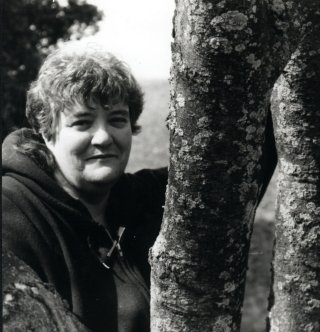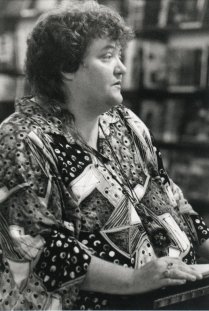|
 |
|||||||
|
Karen Snider was the subject of an interview by the Milwaukee LGBT History Project early in 2003, and was featured in a display first appearing at PrideFest 2003. Karen Snider's life raises the important, related questions about the purpose of LGBT activism, about the relationship between culture and politics. She says she's not proud of her "lack of activism," yet her biography reads like a history of lesbian feminism in the United States since 1970. The daughter of a Lutheran minister, Snider lived in Indiana, both Dakotas, and Kentucky before she graduated from high school. She developed a political sensibility early on from being one of the few native English speakers in a predominantly Icelandic community in North Dakota, and from participating in the African-American civil rights movement in Kentucky and Tennessee during the late 1960s. For Snider, lesbian issues and feminist issues are always intertwined, but not always comfortably. She remembers having a lesbian ask her if she would prefer to be locked in a room with all types of lesbians, or with all types of feminists. She chose feminists immediately at the time, although she says now she might well choose lesbians. Snider had known from childhood that she was a lesbian. She can remember four lesbians at her college, her partner, her partner's ex, her partner's ex's current partner, and herself. She visited Milwaukee, found an active group of lesbian feminists, and thought she was in heaven. She quit college to move to Milwaukee. At various times after moving to Milwaukee, Snider participated in several groups, most notably the Amazon Collective, writing for and editing various publications such as Amazon: A Midwest Journal for Women, the Feminist Writers' Guild, the Women's Art Salon, and the Wisconsin Women's Land Cooperative. She won various grants for her writing projects, including a series of poems based on the lives of elderly rural women, and The Dorothy Poems (which is in UWM's Rare Books Collection). In The Dorothy Poems, Snider reconsidered The Wizard of Oz from an explicitly feminist perspective (although, as she notes, Frank Baum, who wrote the original, advocated voting rights for women). For Snider, culture is crucial for the creation of community. She points out that LGBT persons have long contributed creativity to the surrounding culture. But she wants LGBT persons to support our own artists - as LGBT artists - also. And Snider reminds us that politics is not just about elections and laws; she points out that how we think, what we can think - the imagination that is key to spirituality - influence and are influenced by our politics. |
 image1 |
Bio information from Project interview (conducted by Kathy Herbst
and transcribed by William D. Turner).
Photos provided by the subject.
Last updated: 21-March-2005.